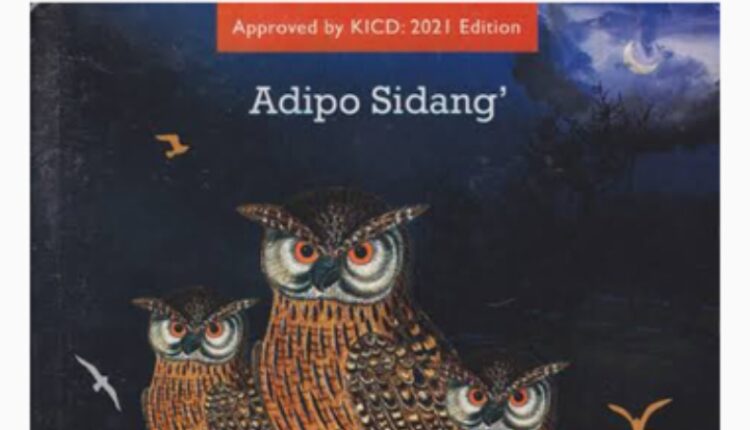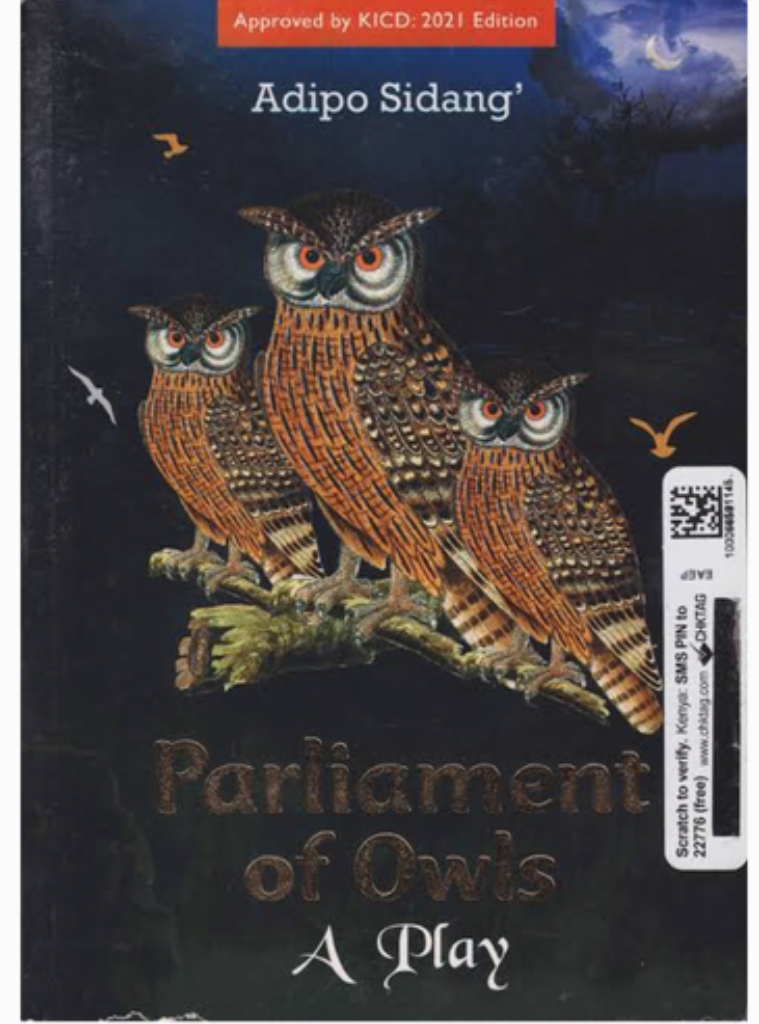
Analysis Of Parliament of Owls By Adipo Sidang
“Parliament of Owls”. A group of owls is actually known as a parliament of owls. Contextualized, owls are a symbol of bad omen in most if not all African cultures. There is a lot of semblance between our parliament (read leadership) and owls hence the use of the term.

What is the play about?
The play is set in the Kingdom of Birds ruled by the owls, with Parliament of Owls as the most powerful institution only comparable to the Royal Trees – the abode of the Royal Owl, King Tula Nyongoro. Money Bags Owl is the Royal Owl’s most trusted ally but he is corrupt, and goes grabbing every tree around. Besides he is the “sponsor” of Socialite Owl who uses her position in Parliament to push for passing of bills like the “Make-Up” Bill and works closely with Red String Puppet Owl and other sycophants in ensuring the interests of owls are protected, for instance with the passing of the Moonlight Bill.
However, Iron Lady Owl leads some owls in rebelling against bad governance. The rebel owls, together with Day Birds, Grain Eaters and some Night Birds and Omnivores (like Fleshy Carcass Vulture) join hands to support a tiny female Day Bird called Oyundi the Fire-finch who happens to be as cunning as her trainer Ogila Nyakarondo, the Hare from King Lion’s Kingdom. Oyundi has to work out a plan of how to trick the Royal Owl to ensure Parliament of Owls is replaced with Flock of Birds – an inclusive government. In an effort to do this, Oyundi the Fire-finch discovers the greatest secret in the Royal Trees – “The Golden Bead”. Veteran P leads the parrots in reporting the unfolding events at Parliament of Owls in the Bird Kingdom.
This Set book believes this play is a political satire that highlights how bad leadership, tribalism and corruption can militate against the growth of a society, at the same time it also proves that women and people from minority groups (like Oyundi the Fire-finch, a female day bird) can rise against all odds to bring change without necessarily engaging in violent protests. Most importantly, this play introduces a new perspective of engaging the youth and Kenyans in general insofar as civic consciousness is concerned.
In the Opening Act of the play Parliament of Owls (East African Educational Publishers) by Adipo Sidang, we are immediately drawn into the world of these nocturnal birds by two characters.
Osogo, the weaver bird, is in a state of sadness, as he plays melancholic tunes on his flute. Red String, a sycophantic owl of the Royal trees, with hollow eyeglasses made from millet stalk and a protruding tummy, thus cutting a comic figure, stealthily encroaches (onto) the space of Osogo.But there is nothing comical about their verbal twilight-lit confrontation (as opposed to the literary cowboy shootouts at high noon).
Osogo wants to know why a certain ‘cunning’ weaverbird was killed, yet she had the Right to Life.Red String replies with the cliché that (all) freedoms have their limits.
Then adds ominously: ‘Falcon goes as high as he can because he is created to hit high levels. He can touch the clouds and tell us when it will rain. But you weavers cannot. That is why falcon is our weatherman…’The implication is clear!
Birds like Osogo, the Weaver, are meant to ‘lie low like envelopes,’ in the words of the belligerent if intelligent late Maa politician, William ole Ntimama.And in Adipo’s allegorical play, set in the Bird Kingdom, the owls have cast themselves as the only birds with the capacity to think intelligently and make ‘brilliant’ laws for the good of the Kingdom – which is ruled by a mysteriously malevolent Royal Owl, King Tula
Nyongoro.
As Red String explains to weaver bird Osogo, right from the get-go, ‘we Owls have the largest eyes, and power will always rest with We the night birds and the omnivores, not with you, day-time grain peckers! We must protect the Kingdom from you for the sake of protecting it from Hyena, Snake and Mongoose.’
Sidang’s play may be seen as a play on the narrative of either ‘ruling ethnic ethnicities’ (who believe it is their right to rule based on ‘large eyes’ or tyranny of numbers) or, also, tribal kingpins who pretend to protect ‘community’ turf from other hostile tribal toughs.
Yet, like in the ‘Parliament of Owls’ (which is really the collective phrase for these oft dreaded doom fowl, associated with all sorts of superstition in African folklore, including being harbingers of Death), the way business is conducted in their august House will leave the reader aghast, as they are selfish.
Of course, inevitably, there is rebellion in the Kingdom of Birds, pitting a fiery tiny female fire-finch against Arum Tindi, thunderous ground hornbill and chief propagandist for the parliament of Owls.
This is reminiscent of the sly but persuasive Snowy in George Orwell’s classic ‘Animal Farm,’ whose Swahili version ‘Shamba La Wanyama’ was a Kenyan secondary school set book for many years.
In this paper we are going to discuss the following salient issues; bad governance, death, love and role of women in the society. We will discuss the above issues based on numerous selected poems from the anthology Parliament of Owls which was written and compiled by Adipo Sidang 2016.
In our analysis of an anthology of Parliament of Owls by Adipo Sidang the issues that we discussed will be guided by various authorities who have commented on the issues either directly or indirectly.
In our analysis we shall concentrate on the concern of bad governance, that is how government officials engage in social ills like corruption for self-gratification at the expense of the citizen’s .This is evident in the poem, “Parliament of Owls”. The poems “Left of us” and Flames of freedom” will
guide us in illustrating the effects of political wrangles on the people and the country’s economy in general. We shall focus on the issue of death that brings about emotional and psychological sufferings to the families of the victim .Death having no subjective meaning has become a part of our day to day life hence we must adapt and accept it as a stage in life.
• Women have come a long way in defying the odds and challenging issues of gender inequality that existed and still experienced in everyday life .The poems “Woman in kisii night club” “Free my heart”,” In remembrance of Brenda”, “Marjorie lives on” and “shipwreck” guided in the discussion of roles of women in the society.
• Different characters addressed by the poet paved a way for other women to assume leadership
roles in modern life.Adipo talks about how these women created their own stories by standing for
what they believed in and making major breakthroughs in different fields in the society and literature.
• Today women in positions of power challenge the status quo and this has given more opportunities to women who have been previously disregarded .Growth of women in leadership
positions has streghthened and the world has a new view of women as intellectuals other than sexual objects. Love encompasses a range of strong and positive emotional and mental states.
The poems “Revival” “Ningwendete” “book of love “and “you killed me” guided us in analyzing the
theme of love.
